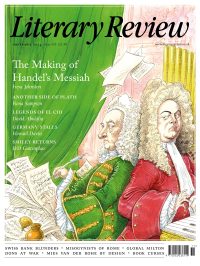Jeremy Wikeley
Death by a Thousand Cuts
The Proof of My Innocence
By Jonathan Coe
Viking 352pp £20
Jonathan Coe’s latest book turns out to be a bag of tricks, but it starts sedately enough. Phyl, a recent English graduate, is back living with her parents, Joanna and Andrew, making puns about ‘parochial’ vicars and contemplating writing a cosy crime novel (‘It would be like writing a student essay: all you had to do was to make sure that you … followed the agreed formula’). An old university friend of her mother, the campaigning journalist Christopher Swann, comes to visit with his adopted daughter, Rashida, who quickly becomes Phyl’s collaborator.
The novel is set during Liz Truss’s brief turn as prime minister. Swann, who writes a blog about the radicalisation of the Conservative Party, believes he has uncovered a secret plot to privatise the NHS. The plotter-in-chief is one Roger Wagstaff, a right-wing lobbyist who happens to have been at Cambridge with Swann and Joanna in the 1980s. Wagstaff’s sinister organisation, the Processus Group, is holding a ‘TrueCon’ conference at Wetherby Hall, a house in the Cotswolds. Swann decides to attend and confront Wagstaff but tells his hosts he has a funny feeling that something bad is going to happen to him there. Is Swann a fantasist or does Wagstaff really have that much to lose?
Here, then, is the perfect scenario for Phyl’s murder mystery. But, as Phyl explains to Rashida, crime isn’t the only genre that sells. There’s also autofiction and Phyl’s own favourite, ‘dark academia’: ‘you know… novels about university students … forming themselves into friendship groups and getting involved with secret societies

Sign Up to our newsletter
Receive free articles, highlights from the archive, news, details of prizes, and much more.@Lit_Review
Follow Literary Review on Twitter
Twitter Feed
It wasn’t until 1825 that Pepys’s diary became available for the first time. How it was eventually decrypted and published is a story of subterfuge and duplicity.
Kate Loveman tells the tale.
Kate Loveman - Publishing Pepys
Kate Loveman: Publishing Pepys
literaryreview.co.uk
Arthur Christopher Benson was a pillar of the Edwardian establishment. He was supremely well connected. As his newly published diaries reveal, he was also riotously indiscreet.
Piers Brendon compares Benson’s journals to others from the 20th century.
Piers Brendon - Land of Dopes & Tories
Piers Brendon: Land of Dopes & Tories - The Benson Diaries: Selections from the Diary of Arthur Christopher Benson by Eamon Duffy & Ronald Hyam (edd)
literaryreview.co.uk
Of the siblings Gwen and Augustus John, it is Augustus who has commanded most attention from collectors and connoisseurs.
Was he really the finer artist, asks Tanya Harrod, or is it time Gwen emerged from her brother’s shadow?
Tanya Harrod - Cut from the Same Canvas
Tanya Harrod: Cut from the Same Canvas - Artists, Siblings, Visionaries: The Lives and Loves of Gwen and Augustus John by Judith Mackrell
literaryreview.co.uk